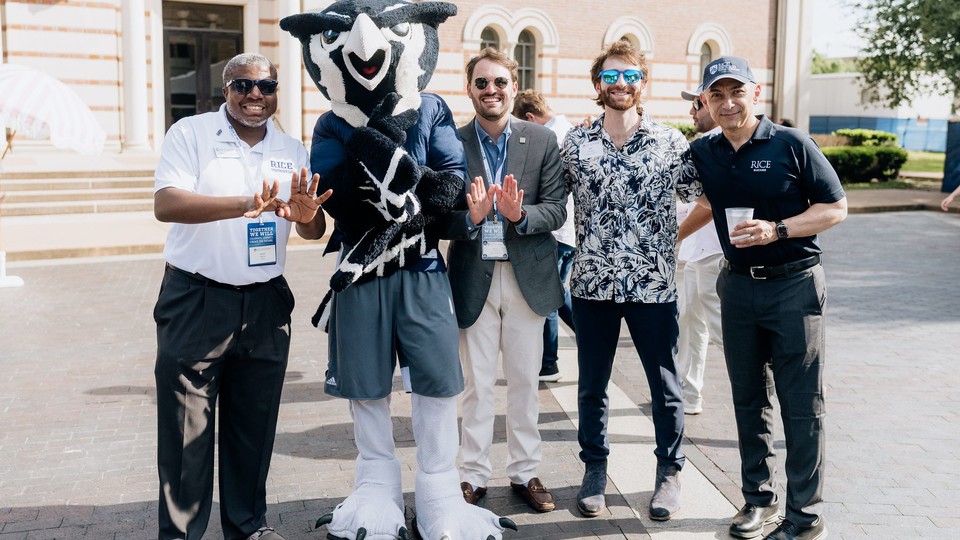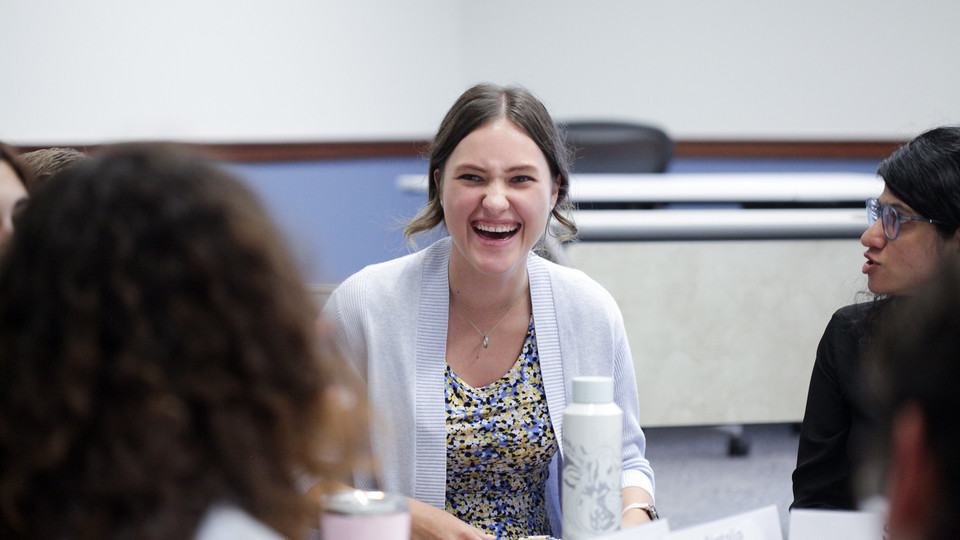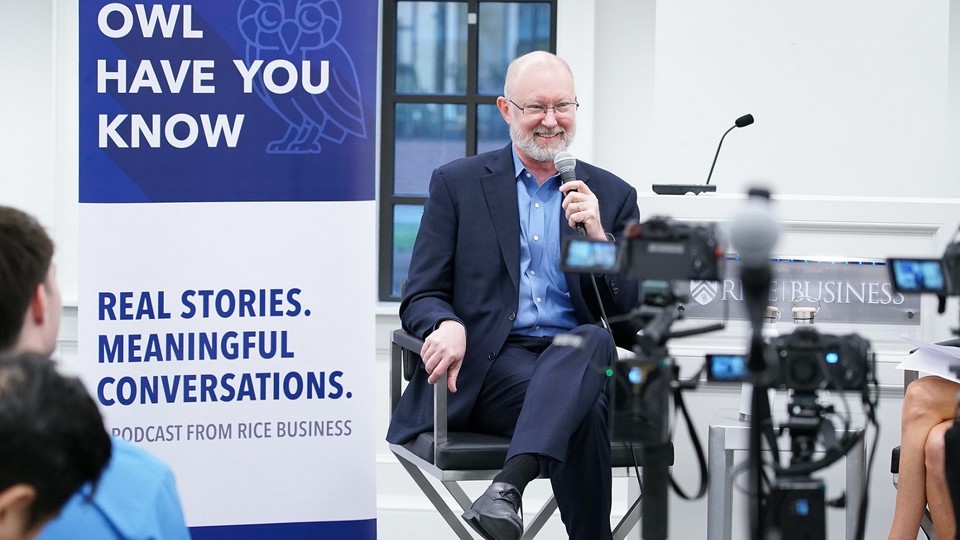
Research: How Gig Platforms Can Mitigate Racial Bias in Ratings
Online labor platforms increasingly rely on customer ratings to evaluate worker performance, yet these systems and their opaque algorithms can unintentionally introduce racial bias, impacting worker pay and opportunities. New research co-authored by Rice Business professor Sora Jun explores why this may be.

Get to Know Sam and Cory, U.S. Veterans and Full-Time MBA Students
Transitioning from military service to an MBA program is a significant shift — one that comes with challenges, surprises and valuable opportunities. Hear from two U.S. veteran Rice MBAs.


Transitioning from military service to an MBA program is a significant shift — one that comes with challenges, surprises and valuable opportunities. In interviewing U.S. Air Force veteran Cory Bryant and U.S. Navy veteran Samuel Goode, we discussed their experiences in business school, how their military backgrounds have shaped their approach to leadership, and what advice they have for other veterans considering an MBA.
What made you decide to pursue an MBA?
Cory: After leaving the Navy, I worked in corporate project management in the aerospace defense industry. An MBA felt like the right next step to expand my skills and transition into higher-level leadership roles.
Sam: I came directly from the military, so I saw the MBA as a way to explore new career opportunities. It’s been a huge shift, but that’s what I was looking for.
How has your experience been in the MBA program? Did it meet your expectations?

Cory: Academically, it’s exceeded my expectations, which is great. I wanted a rigorous program, and Rice has delivered. Beyond the classroom, I was expecting to be more involved in clubs and student organizations, but I’ve realized that the experience is what you make of it. There are plenty of opportunities — it’s just about being proactive in engaging with them and finding the right fit.
Sam: I agree. Coming from the military, I tend to compare everything to my past experiences. A lot of the leadership lessons we cover in class feel familiar, like things we already did in the military. One surprise for me was how STEM-heavy Rice is — I didn’t expect that when I started. Also, Rice Business has been a great place to build a strong network, and I’ve been surprised by how many different industries and backgrounds are represented in my class.
What are some key differences between leading in the military and leading in a business setting?
Sam: I think it is a lot of understanding the context and then taking action accordingly. In business, it is not just about managing chaos but also planning ahead. That’s a big difference.
Cory: Exactly, in the military, you learn how to handle high-pressure situations and make decisions quickly. But you can also pick up some habits — like being too controlling. In business, leadership is about influence, not authority. I’ve also found that my ability to handle pressure has been a huge asset. Some classmates find the MBA workload overwhelming, but after military service, it feels very manageable. We’re used to high-stress environments, so we can take a step back, prioritize and handle challenges more efficiently.
Interested in Rice Business?
What opportunities have you been able to take advantage of as veterans in the program?
Cory: The veterans’ career conference was an eye-opener for me. Initially, I didn’t realize how valuable it was, but after attending, I saw just how many doors it opened. It was a great reminder that as veterans, we have unique strengths that companies actively seek.
Sam: There are networking events and the Veterans Business Battle. Plus the shared experience of the military with other veterans creates an instant connection. Rice Business offers a lot of opportunities to shape the veteran experience and create stronger connections among veteran students.
What’s your favorite part of a typical MBA day?

Sam: Interacting with classmates. You learn so much from people with different industry backgrounds.
Cory: For me, it’s the ability to fully immerse myself. I debated between doing a Full-Time MBA or an executive-style weekend program, but I chose this because I wanted to dedicate myself fully to the experience. The personal connections have been the best part.
Sam: And, let’s be honest — sometimes the best moments happen outside of class. Like when half the class spontaneously decides to grab a drink at Valhalla.
What subjects have you enjoyed the most?
Cory: Surprisingly, finance and accounting. I came in thinking I’d enjoy strategy and marketing courses, but I’ve realized I connect more with numbers.
Sam: Business of Healthcare has been interesting for me. I’m still figuring out what I like best.
What advice would you give to veterans considering an MBA?
Cory: Stay organized from the start. Don’t let coursework and recruiting pile up. Be open-minded.
Sam: Also, take advantage of every resource available. The CDO is there to help, and getting career guidance resources is very valuable, so make the most of it while you’re here. And don’t be afraid to network. Veterans have a built-in support system — use it.

Get to Know Lipi Gandhi, Full-Time MBA
Lipi calls Vadodara, India, home and worked as a brand and communications lead at Execo (formerly Cacti Global) prior to joining Rice Business. She chose the Rice MBA because of its strong reputation for entrepreneurship and collaborative, tight-knit community. Post-MBA, she is interested in working in brand and product management, with a focus on customer experience.
You May Also Like
Keep Exploring
Where Big Ideas Take Flight feat. Dr. Paul Cherukuri
Season 5, Episode 3
Dr. Paul Cherukuri chats about how Rice's Office of Innovation is paving the way for world-changing ideas and cementing Houston as an entrepreneurial leader.
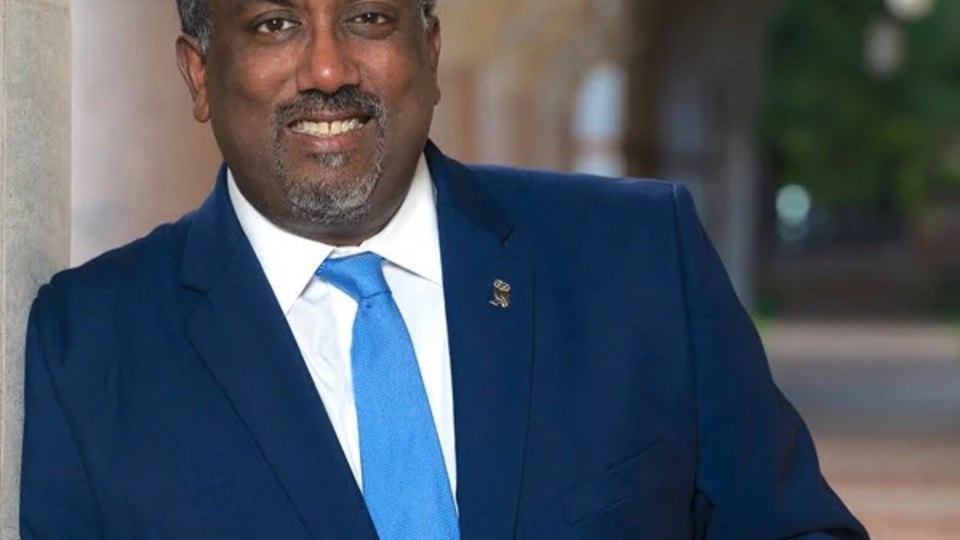
Owl Have You Know
Season 5, Episode 3
A great idea is just the beginning. How do you turn it into something bigger?
Dr. Paul Cherukuri, Rice University's first vice president for innovation and chief innovation officer, works with academics and industry titans to remove roadblocks for budding entrepreneurs and help cement Houston and Rice as top hubs for innovation.
Paul joins Owl Have You Know host Maya Pomroy ’22 to chat about how the Office of Innovation is paving the way for cutting-edge, world-changing ideas. They also discuss The Ion, Rice’s Midtown hub for entrepreneurship, why Paul chose to earn a Ph.D. in chemistry at Rice, and his path to leading innovation at the university.
Subscribe to Owl Have You Know on Apple Podcasts, Spotify, Youtube or wherever you find your favorite podcasts.
Episode Transcript
-
[00:00]Maya Pomroy: Welcome to Owl Have You Know, a podcast from Rice Business. This episode is part of our Up Next Series, where faculty, researchers, and alumni weigh in on the trends currently shaping the world of business.
Thank you for joining us today for our latest episode of Owl Have You Know. I'm your host, Maya Pomroy. Today, I'm joined by Dr. Paul Cherukuri, Rice University's first vice president for innovation and chief innovation officer. Welcome, Dr. Cherukuri.
[00:30]Paul Cherukuri: Thank you. Pleasure being here, Maya.
[00:32]Maya Pomroy: Well, we're thrilled to have you as well. You are the first person to hold this role as the chief innovation officer. And obviously, based on your background, you are, I mean, I don't think there's anybody better than you. You're a physicist, a chemist, a med tech entrepreneur, decades of experience in academia, pharmaceutical industry. What I found interesting is that you are actually a Rice graduate. You earned your Ph.D. right here at Rice, your Ph.D. in physical chemistry, under Nobel Laureate Richard Smalley. So, I want to start with what brought you to Rice, originally.
[01:12]Paul Cherukuri: Oh, wow. That's… going back, it was an interesting time. So, back in about 2001, I was working in the Texas Medical Center. I had taken time off of medical school and was starting a company. And then I met Rick Smalley while I was working at the med center. He was doing nanotech and he wanted to take nanotubes, in particular, which he discovered the buckyball and nanotubes.
[01:39]Maya Pomroy: Oh, I used to… wait, buckyballs, they used to sell those in kids toy stores, right?
[01:44]Paul Cherukuri: Yeah, yeah.
[01:44]Maya Pomroy: Yes, I used to sell them in my toy store. And then, you know, you can't sell them to kids that are little because then they'll swallow them. But anyway, I know what those are.
[01:51]Paul Cherukuri: Yeah. Those are the magnetic, sort of, kind of, beads. But the buckyball itself is like a soccer ball, but it's a molecular version of a soccer ball, right? So, like, the stitches on a soccer ball. So, he was the one who discovered that. He was part of a team here at Rice, him and Bob Curl. And then, also, a professor out in England, Croto.
And so, what they did was they found this new molecule of carbon. And that was exciting. Nobody knew carbon could do that, to make a closed cage that looked like a soccer ball, right? So, he discovered that. But then there's an elongated version that is like a tube. You can just imagine taking halves of the soccer ball and pulling it apart and then sticking a cylinder in between there that looked like a chicken wire.
And so, that thing is called a nanotube. And so, he was wanting to use nanotubes in the med center as a new kind of drug delivery vehicle and things like that. And so, that's how I got to know him. And then, he asked me to come to Rice. And the way he pitched it was interesting. He was a very charismatic guy and a really ridiculously cool dude. He goes, “Why don't you quit medical school and be a real doctor?” That’s what he said. And so, he wanted me to come over and be his student. And the reality is, you know, I said no.
[03:11]Maya Pomroy: Really, you said no?
[03:14]Paul Cherukuri: Yeah, I said no the first time. I said no. And it was the strangest thing. I said no because I wanted to finish what I started. I wanted to… you know, the company was not doing well, and I was going to finish up medical school. Fundamentally, you know, I wanted to do that.
And so, then I said to him, no. And he didn't, he took it well, but the weird thing was that, that night, I couldn't sleep properly. And so I felt like I was getting wrestled, and it was like this really strange spiritual thing. I got up the next morning and I went back to his office and I said, “Hey, would you reconsider this option?” And he said, “Absolutely,” and that he would convert half his lab into a bio nanotube lab if I joined the group. And surely enough, he did. Six months after joining, he started doing more bio, kind of, focus research as well as nanotech research. It was interesting. So, I was just very, very fortunate.
[04:09]Maya Pomroy: So I think, when people say, you know, “Why don't you sleep on it,” that was really what had happened.
[04:17]Paul Cherukuri: It was. I still remember it. It was the strangest thing, but I've never told that story. I don't know why. But you asked me today and I remembered this. I said, no. I said, no, the first time, to come to Rice.
[04:27]Maya Pomroy: Well, and I have a feeling that he probably hadn't had a lot of no's.
[04:34]Paul Cherukuri: Right. So, after I got to Rice, my whole life just transformed. Everything. I met my wife here in the lab shortly after I joined, and all of that. Everything just changed when I got to Rice. Rice changes everything.
[04:50]Maya Pomroy: Rice changes everything. I would agree. I would agree. Rice has changed the trajectory of my life as well because here I am sitting with you.
[04:59]Paul Cherukuri: It really is. I mean, and that's higher ed in general, but I think Rice is so intimate, so personal, right? The faculty are very personal. I mean, he took me under his wing. I didn't realize how special that relationship was until after he passed away. He passed away from cancer. And then looking back, you go, “Wow, why me? You know, what was it that we bonded over?” But it was mainly physics. We just would talk about physics all the time. That's why it was a great, great time. And that was Rice. That is Rice, in many ways. The faculty really genuinely care, and they want to change the world.
[05:33]Maya Pomroy: Yeah. Well, you had someone do that for you a few years back. And now, how cool is it that you get to be that person for students now? I mean, it's a wonderful full circle story. You know, so, you're building this office, really, from the ground up, the office of innovation. And that's an entrepreneurial task as well. So, tell me about how you were approached about this opportunity to come back. Well, you've been at Rice since 2014.
[06:03]Paul Cherukuri: I came back, yeah, in 2014.
[06:06]Maya Pomroy: So, tell me the arc of this project.
[06:10]Paul Cherukuri: Well, it's interesting. When I came back in 2014, I was managing a research group for Jim Tour, who is the prolific entrepreneur faculty member on campus. He has multiple, multiple companies — I think 13, 14, something like that — under his belt.
[06:25]Maya Pomroy: A serial entrepreneur, Al Danto would probably call him.
[06:32]Paul Cherukuri: He is a serial entrepreneur, yeah. And I would say serial founder, right? And what's interesting is that he's doing that and then his students in postdocs then take those companies out and, kind of, get them to get them to go. And that's generally what happens, right? A faculty member will start the company.
And so, I was asked, after running the Institute of Biosciences and Bioengineering at Rice for a few years. The opportunity of this new vice president for innovation came up and I was, actually, on the committee to review who would be the person. And then I was asked by some of the committee members to get the hell off the committee and…
[07:09]Maya Pomroy: Like, “It's you. Surprise!”
[07:12]Paul Cherukuri: Well, and they said this, and I was like… again, it was this no reaction that I had. I was like, “Why would I do this?” I was trying to find somebody else, right? And it was just a very interesting turn of events. And then, so, I met with my family and we had a family meeting. “Do we do this?”
[07:31]Maya Pomroy: Yes, I have those, too, with our family before we make big decisions.
[07:34]Paul Cherukuri: Yeah, big decisions, right? Because it was a turning point. Do I go down this road or do I do something different, right? And so, we had that conversation.
At the time, I was in business. I was teaching entrepreneurship with Jack Gill, who's the patron saint of entrepreneurship around here. And he and I taught life science entrepreneurship and learned a lot about teaching entrepreneurship from that. And so, that was always, sort of, woven into what I was doing. And I love the idea of having a VPI at Rice who would do this, right? And then it turned out to be me.
So, it's interesting because you're building it from the ground up, but the critical thing is, like with any startup, it's who you bring in and then how you drive that forward, and how does it align to the rest of the mission, right? So, what's interesting about creating this sort of startup that creates other startups is that you're a part of a larger organization, right? So, it's not like it's an independent startup that has a very clear product line and only that is what you need to do. You have to integrate this as a division of a larger organization, which is called the university. How do you design that?
[08:42]Maya Pomroy: That was my question, next question, how do you do that?
[08:45]Paul Cherukuri: How do you do that and not, kind of, cannibalize any of the other activities or threaten any of the other folks and all the stuff, right? It's a fascinating kind of balance. And what I find that works is you generally go to the people who are creating. So, faculty members are generally creative individuals who are inventing technology, right? That's one aspect of it. So, you foster that. But then you also have to foster the founders, the idea of a new company founder. And a faculty member can be a founder and he's usually a founder, but the people who are actually building the company is the other, sort of, side that you need to build up.
And that's through some of the organizations that are under the business school, like, Lilie or Rice Alliance, or even RCEL and other kinds of organizations across Rice. They try to help do that. But can you pull that together in a way that they can get fostered so they can really help create these new, kind of, startups that are coming out of Rice?
But even after you do that, the startups have to go somewhere. They can't stay on campus, right? Like, when Smalley was building his company, they built it out of, you know, just a regular kind of commercial area, just, you know, rented a space. And then they built and built and built, but they have to have a factory to be able to make nanotubes. They have to have a chemical plant. Things like that right? And Rice never really had infrastructure to support and help make that happen.
What we are doing, and we are very fortunate, is that we have two campuses that we can, kind of, foster, one of them being the Ion district and the other one being the Texas Medical Center, right? So, we can do a lot of our bio, kind of, tech, startups over there and we can do the energy tech and everything else over at the Ion. And that's how we've, kind of, positioned it because we have those opportunities. And Rice is unique in that, right?
[10:32]Maya Pomroy: Yes, and Houston's actually unique because we're in the center of energy and healthcare and aerospace, and, you know, there's so many unique and fascinating industries right at our fingertips, you know. I mean, I don't really think that there's another place in the country that really offers this type of opportunity.
[10:53]Paul Cherukuri: That's right. It really is interesting. And, you know, a good friend of mine, Steve Kean, at Greater Houston Partnership, he said something that, kind of, resonated and just stuck in my head. He was like, “You know, Houston's a great product but not a great brand. People don't know about the brand of Houston well enough, right? We haven't branded it enough, right?”
There's so many different products that come out of Houston as a thriving metropolis. And we know that, but we haven't marketed it well. And it's similar to the way Apple was many, many years ago, right? Apple made these, sort of, niche products, but it didn't have market penetration because the brand didn't reflect the actual product. And then when they aligned everything, they were able to get a greater market share and now take it over the world, right?
I think there's much of that here, right? We have so much great talent and great economy of scale in Houston. And on top of that, you have the greatest university in the state of Texas. I'm saying that.
[11:53]Maya Pomroy: That's right, that's right. Yes, we are.
[11:57]Paul Cherukuri: I guess that’s on recording. And now, A&M and UT and everybody's going to get pissed at me, but I'm sorry.
[12:02]Maya Pomroy: No, no, no, no. I mean, listen, we're about being authentic here on the podcast, and that's what we're going to do. No, I'm with you.
[12:09]Paul Cherukuri: But it is. And I think Rice is the greatest institution in the state of Texas. And I would say, probably, also across the country.
[12:17]Maya Pomroy: Well, Rice is the number one school for entrepreneurship, I'm just going to say, put that out there.
[12:22]Paul Cherukuri: That’s right.
[12:22]Maya Pomroy: And that's something that we're very… Rice Business is very, very proud of.
[12:26]Paul Cherukuri: Yeah. And Lilie has done a great job for that, right? The Liu Idea Lab for Entrepreneurship, Innovation and Entrepreneurship. It's really a great organization. And then, you have Rice Alliance, which is this…
[12:38]Maya Pomroy: With Brad Burke.
[12:39]Paul Cherukuri: With Brad… the Brad Burke. And 25 years of that, right? And you just… you have this capability of both this resource to be able to start startups, but then also connect them to corporates. You have this entire, kind of, ecosystem that we've built. And I think people are getting more and more awareness that all that is there.
So, I mean, the majority of my time is, kind of, plugging the gaps of what might be missing? And so, we created new vehicles to be able to do investments or de-risk technology so that our companies that come out are much more stable. That's been a lot of the time over the last two years. And I think, building upon what Lilie has built and Rice Alliance has built and others have built and then taking it even further is both the challenge, but also, privilege of doing them.
[13:27]Maya Pomroy: Yes, absolutely. It's the idea of all these calculated risks, right? I mean, it's also about instilling this faith of having students and everyone… like, you've taken a lot of calculated risks in your life for things that you've done. And to translate that to others, how do you do that, you know? Because if somebody is… you know, they have the startup and then they have to figure out… you know, first of all, it's a risk to even do that, number one. Number two, then you have to figure out, you know, how do you build it? How do you brand it? And then how do you commercialize it?
[14:05]Paul Cherukuri: Yeah. All of that has got to get built out? And so, the how you do that, it's interesting. There are some people who just naturally resonate with the idea of doing it, right? The entrepreneurial spirit is within them, and it's active, right? Then there are some people who are, sort of, suppressed, repressed, who have always wanted to do it and weren't sure if that was allowed, right, or if that was fostered for their career. And what we provide is the capability and also the, sort of, inspiration that this is not only possible and welcomed, it's something that we actually want to promote, right?
You know, you can't remove all the dangers of doing it. There's a little bit of a thrill of taking that risk. And those, kind of, thrill-seeking risk-takers are what we're also supporting. And doing that in a way that doesn't jeopardize the university, but actually maximizes both the financial and reputational impact is really the goal.
And I think, at the end of the day, those individuals will go out and change the world. And they'll know that they were not only born at Rice but, I think, fostered. That's what we want them to come away with.
[15:17]Maya Pomroy: Can you share, you know, a project that some students are working on that is really exciting to you right now?
[15:25]Paul Cherukuri: There are a few. There's one project in the media. When I think about Direct H2, using a solar cell to be able to convert sunlight into hydrogen gas, right? So, that you can have this new fuel. That came out of Aditya Mohite's lab. There's a great company that already exists. It's been around for a while, out of Matteo Pasquali's lab. And that's around nanotubes. Dexmat is one of the companies. There's so many of them.
And so, what we're going to be doing actually on February 14th is having an event about the Nexus. The Nexus is the first footprint of Rice formally inside the Ion. Even though we own the Ion District and we've been fostering the growth of that, we never really had a place where Rice people could go inside there. And so, we've been building up the Nexus. And now, we have a great executive director that's been appointed, Sanjoy Paul, who reports in to me so that the Nexus can be fostering our startup. So, what does it do? It's got… it's facilities, friends, funds is how we say it.
[16:26]Maya Pomroy: Facilities, friends, funds, I like it.
[16:29]Paul Cherukuri: Yeah. It's a place where you can keep your startup one year for free, so that the startup can have a runway, right, that they can get growing. And then we have friends in the Ion community, the innovation community of Houston, with venture capital built in and networks to be able to help you build your company. And then we also have funding, from both the internal funding, but then we also foster SBIRs and STTR grants and things like that for the startups to get going.
[16:56]Maya Pomroy: Could you explain those acronyms?
[16:57]Paul Cherukuri: Those are non-dilutive grants to companies to be able to build. So, they're federal grants to be able build. So, I can't remember what SBIR stands for, small business innovation, something. But it's a grant to be able to build your business up. And it's a contract that you get into a company.
Now, those pots of money have always been out there, but we haven't had infrastructure to really drive it. Like, different faculty will go after it, depending on the companies. But we've never really had those kinds of people to really fully support it. And so, that's what we have inside the Nexus. I've always said that the Ion is Rice's love letter to Houston. And so, this is us giving back to Houston, saying, “We love you and we're here to help you. And we're a part of you. We're a part of this,” right?
[17:43]Maya Pomroy: Well, and I do want to talk about the Ion. You know, that's something that is very near and dear to you in your heart. And I think that, you know, there's some people that still aren't aware that it's right there next to Greentown Labs. It's right there. So, tell me about the Ion. Because I remember when it was the old Sears building, you know.
[18:03]Paul Cherukuri: Yeah, me, too.
[18:03]Maya Pomroy: It was, like, this dilapidated building. And then, you know, that's around the time that I started at Rice. And since then, I mean, talk about a transformation of that entire area of the city and really taking advantage of using all of these amazing things that we have in Houston. So, tell me about the Ion and how it came to be and where it is now and your hopes for the future. Just a few things, you know.
[18:28]Paul Cherukuri: Well, I mean, the Ion predated my role in this office. But it really was something that was set up by Rice for economic development of the region. And it was… it is a part of the community. The idea is that we're building an ecosystem, innovation ecosystem across Houston, almost future-proofing Houston against, you know, remember back in the ‘80s, there were some economic downturns, as oil and gas, sort of, kind of, contracts, so does Houston.
[18:57]Maya Pomroy: That's a cyclical business that happens every couple of years.
[19:01]Paul Cherukuri: That's right. That’s right. Every few years, you see this kind of effect. So, how do you really, kind of, thrive in that kind of economic swings, right? So, one of the things that you can do is build these innovation districts. Other cities have done this as well, right? So, Detroit has done it, and others.
And the idea is that we would create company interactions with, like, established company interactions with startups. And what we're doing now is really building the startup side of the house. We have major corporates inside the Ion building itself. And, you know, it's a who's who of energy companies. And then we're putting in our startups in there so that they can be very close and they can see how to get to scale with your new energy company or other companies that we would bring in. And that's what the Ion represents.
[19:47]Maya Pomroy: Sort of like Halliburton. And then you had Halliburton Labs, right?
[19:50]Paul Cherukuri: Yeah, and you have Halliburton Labs up on the north side, right? And we partner with them as well. And Greentown Labs, right? And now, there's this amazing, amazing CEO who's coming in, and she's going to be… she just started. Georgie is her name and she's going to be a really, kind of, galvanizing force that's going to help the district really grow.
So, we're seeing all of those pieces. And the reason we're building all this is that Rice knows that it's not just us but it's us being a part of the rest of us, right? So, the entire community. And how do you do that? And we have a place to do it.
One of the beautiful things I think about Houston is we get dinged for not having zoning laws, but I actually think it's a… I think it's a great thing. And it has allowed us to economically, kind of, grow and thrive and expand the city. The problem with expansion of the city is people density, right? So, how do you get people to be right next to each other? Because that's when things start to magically happen, right? You got to get close to others.
[20:50]Maya Pomroy: Yeah. Well, and it's, also, it's entanglement theory, right? It's where… you know, I like physics, too.
[20:58]Paul Cherukuri: Okay. So, there is… you're going to take me down a rabbit hole.
[21:06]Maya Pomroy: That's what I like to do.
[21:07]Paul Cherukuri: Well, okay. So, it is interesting. There is an entanglement phenomena with this. And what I see is like a resonance. You were asking me, how do you get people to, kind of, do things on campus? There's a resonance effect that happens. Like, when like-minded people meet each other, they get each other, right? It's, like, this thing that happens that is an intangible. I see it all the time. And it's a fascinating effect. Like, if I hadn't walked across the street and met Smalley, you know, just being in that proximity, that, I would have never met my people. And Rice is my people, right? I don't know if that's the right grammar, but you get it.
[21:48]Maya Pomroy: I get it.
[21:49]Paul Cherukuri: Yeah, I know. When you find your tribe, it's very, very different. And I think that Ion represents that ability for us to be able to concentrate people so they can meet each other, but then also provide resources, both with the corporates and the venture capitalists that are in the building. And then we're bringing in government and others to really, kind of, subsidize things and help us grow these companies. And then not only the companies, but grow the community. And that's what the Ion represents, right? So, it is, I think, a magical place in many ways. If you go in there, there is an energy. There's a buzz that has happened now.
[22:25]Maya Pomroy: Well, and so, if there's someone that's listening that has this idea and really, you know, wants to move it forward and is thinking about, you know, all the different pieces and how to commercialize it, what advice would you give them? Because there's a lot of people that have ideas and fascinating ones, but just don't… they're just scared of failure, right? It's just like, “Well, I don't want to look… what if it doesn't work?” And then, you know, the response is, “Well, what if it does, you know?” So, if there's someone that is in that space right now or, sort of, on the cusp of really, sort of, taking that leap, what advice would you give them?
[23:06]Paul Cherukuri: Oh, that's tough. There are a lot of people who take leaps who shouldn't. And then there are a lot of people who don't take leaps that ought to, right? So, how do you figure that out? That's your question.
[23:17]Maya Pomroy: Sure.
[23:18]Paul Cherukuri: It's an interesting thing. One of the things that I find, kind of, illuminating is pressure testing or, kind of, asking people who will give you the straight talk about it. And you've got to ask people that really understand risks but also understand future. And there's only a few of those kinds of people in the universe that you can really trust. You got to find those people. And you can find those people mainly because we've created the Ion and the Ion District to do that. And I'm happy to opine on things, but none of us really can tell the future of things, right? And we can make predictions, all sorts of things, that we say, “Oh, no, this is where the market's going.”
[23:58]Maya Pomroy: Yeah, nobody knows those answers.
[24:00]Paul Cherukuri: Nobody knows those answers. And the reality is you take the shot. Just take the shot, find out. But one thing I like to do is, you know, we call it the ugly baby problem, right? You have a baby, you think you have a baby that's beautiful, and nobody's told you have an ugly baby. And I think, sometimes, you just got to hear that, “Well, that baby, that's not a pretty baby.” And, you go with that, right? It's like that Seinfeld episode, you just don't want to say it. But still, I think it's worthwhile doing it, because unlike a baby, you can actually reform your thesis, your model, your product. But, you know, I personally think, you know, you go for the risk and you learn it by doing it and take the hits.
If you can't take the hits, you're not going to be very happy. But happiness is a temporal thing, right? It's over a time span. There'll be ups and downs. And you just got to roll with that. And, you know, it's easy to say, hard to do. But I think people who like to take risks should just go for it.
[25:02]Paul Cherukuri: I get the itch all the time to, like, finish this kind of role and then go back and create this new thing. And I might do that at the end of this journey, this particular one.
[25:14]Maya Pomroy: But not anytime soon, right?
[25:16]Paul Cherukuri: Right, right, yeah.
[25:17]Maya Pomroy: Going to hold you to it.
[25:18]Paul Cherukuri: We got to finish what we started. I think we're laying the foundations and that's it.
[25:22]Maya Pomroy: That goes back to the beginning when you said I said, “No, because I wanted to finish what I started.”
[25:27]Paul Cherukuri: Yeah. And I got to finish what we've started here. There's a lot of amazing people who said, “I want to do this now.” And I think that's what we're fostering. And just seeing the students doing that, it's amazing, what's happening over at Lilie. Those students are very passionate, and they really want to do this and do this well.
And I think that we could end up doing it. We've had some great entrepreneurs who have been born out of Rice, right? Coinbase was founded by a Rice guy, right? It's good, but we need to foster it. And that's what we're building. I mean, it's not me doing it. It's so many other people. I have an amazing, just an amazing team. They are really leading it. I'm just making sure to keep the dogs off and try to get the resources to keep going. And I think that's beautiful.
[26:12]Maya Pomroy: I think you're doing more than just that, significantly more than just that. And I think that, you know, it's a… what an opportunity for everybody at Rice to have this new office of innovation and, you know, the fact that leadership recognize that this is the future, and it's not just the present, it's the future, and to really source the best of the best and to work as hard as you possibly can and to also find the students that have the capabilities of really changing our world for the better.
So, I just have one more question for you, because I know you've got things to do. You've got some things that might…
[26:56]Paul Cherukuri: We’re all good.
[26:56]Maya Pomroy: So, final question, what are you the most excited about over the next two to three years?
[27:05]Paul Cherukuri: I’ll give you the general answer, because if I give you a specific, we give away secrets.
[27:10]Maya Pomroy: Oh, well, we don't mind if you give them away.
[27:12]Paul Cherukuri: Oh, right. Yeah. So, like, just this morning, I had a great meeting, like, at 7:00 a.m. Apparently, all of us get up early, these entrepreneurial types, right?
[27:25]Maya Pomroy: They don't sleep.
[27:27]Paul Cherukuri: Yeah, no. I don't sleep. Do you sleep much?
[27:28]Maya Pomroy: No.
[27:28]Paul Cherukuri: No, I don't sleep much at all.
[27:31]Maya Pomroy: At all.
[27:32]Paul Cherukuri: Yeah. And, you know, I, kind of, envy people who go through these eight-hour sleep cycles. I'm like, “I don't know what you do.”
[27:42]Maya Pomroy: Or, how you unplug. Like, I don't… because your brain is constantly going.
[27:46]Paul Cherukuri: Yeah. How do you shut down? How do you shut down? I just… I don't need much sleep, so I'm very, very fortunate. And when I sleep deep, I stay up for, like, 48 hours. It's not healthy, but I try do the quick sleeps.
[27:59]Maya Pomroy: Doctors do that. That's a doctor thing.
[28:01]Paul Cherukuri: Is it a doctor thing?
[28:02]Maya Pomroy: I think so. I think so.
[28:04]Paul Cherukuri: Yeah, I guess that is. But anyway, I had this great meeting this morning and we were talking about how to really drive the future of the city and the triangle, right? And it's a rare thing to talk to somebody who's not just sitting in Valhalla, kind of, opining, but to talk to people who can actually make that happen, right? That's what's very exciting. Over the next two to three years, you're going to see Rice leaning into more of these, sort of, not only conversations, but designing of the strategy of the future growth, right? And being able to help create jobs but really break through technologies that change people's lives.
So, what you're going to see over the next two or three years are those things emerging from Houston, in a way that's much clearer, and that it's not the incremental progress, but some of these companies that do this hockey stick kind of performance in both impact and revenue. So, that's a general way of saying that there's a lot of positivity out there.
There's also going to be companies that just don't make it, right? It's going to happen. But that's going to be in the noise because we're going to have these amazing outcomes from our founders that are coming in to really create these, I think, fully de-risked or… as de-risked as possible is possible technologies that can go into a company, that's bankable and then grow in Houston to be able to, I think, change the world. And that's what I'm excited about.
[29:30]Maya Pomroy: Yeah. Well, so, Rice is where you belong. I think that's what they say at the business school. And where you belong is how you change the world. You first have to figure out where you belong, and then you can change the world.
[29:42]Paul Cherukuri: And the business school is one of those places. There's so many special things about Rice. It's almost like we're lying when we say this, but I wish people would just believe it. You have to be here to know it. I think that's one of the big things about it. And one of the reasons we're moving into the Helix and into the Ion is so that we, sort of, have these embassies out there where people can come contact us and then get pulled into the community. There are a lot of people who need to interact with our institution that may not get in for the grades, but they get in with the ideas and the new kind of technology that they want to bring in, right, and partner with our talented folks. I think it's crazy exciting.
[30:26]Maya Pomroy: It is exciting. And we cannot wait to watch all of these things unfold. And we would love to check back in with you and part of your team, I think that would be great to keep our eye on everything that is continuing to happen at Rice and, you know, to watch the future unfold right within our own community.
[30:47]Paul Cherukuri: It’s thrilling. It's thrilling. And, you know, I've got a lot of business folks. You know, another guy on my team is Adrian Trömel. I don't know if, you know, Adrian, but he's an MBA.
[30:56]Maya Pomroy: I do. I know Adrian and I know his wife.
[31:00]Paul Cherukuri: Oh, you know his wife?
[31:01]Maya Pomroy: Because she's originally from Russia and I was a refugee from… so, I do. I had dinner with them. I do know them. I love them. They're a wonderful couple.
[31:09]Paul Cherukuri: They're amazing. He's a genius level guy. And I'm also very fortunate to have him on this team. And it's really stellar. And all of them are self-starters that go, go, go, right? And that's the best kind of team to have. Super creative.
[31:23]Maya Pomroy: And they mentor.
[31:24]Paul Cherukuri: And they teach others. And I think that's so important, especially, in this environment. So, I'm very fortunate for all of them. So, just wanted to mention that because he has an MBA and I think we all have a special love of the business school.
[31:39]Maya Pomroy: Yeah. Well, I will tell you, I feel very fortunate to have had this time with you. I hope that you enjoyed it. I certainly did.
[31:45]Paul Cherukuri: Oh, yeah, this was fun.
[31:47]Maya Pomroy: And to be continued, because I have a feeling we'll be knocking on your door again.
[31:52]Paul Cherukuri: Yes, I would love it. Would love it. This was great. I enjoyed it.
[31:56]Maya Pomroy: Well, thank you. Thank you, Dr. Cherukuri. It's been a pleasure.
[32:01]Paul Cherukuri: Thank you so much. I appreciate it.
[32:07]Maya Pomroy: Thanks for listening. This has been Owl Have You Know, a production of Rice Business. You can find more information about our guests, hosts, and announcements on our website, business.rice.edu. Please subscribe and leave a rating wherever you find your favorite podcasts. We'd love to hear what you think. The hosts of Owl Have You Know are myself, Maya Pomroy, and Brian Jackson.
You May Also Like
Veterans Business Battle returns to Rice March 13-14
On March 13-14, Rice Business is hosting its 11th annual Veterans Business Battle — a forum for veterans to connect with investors, advisers and resources. Each year, the event gives military veterans an opportunity to pitch business ideas for a chance to raise capital.
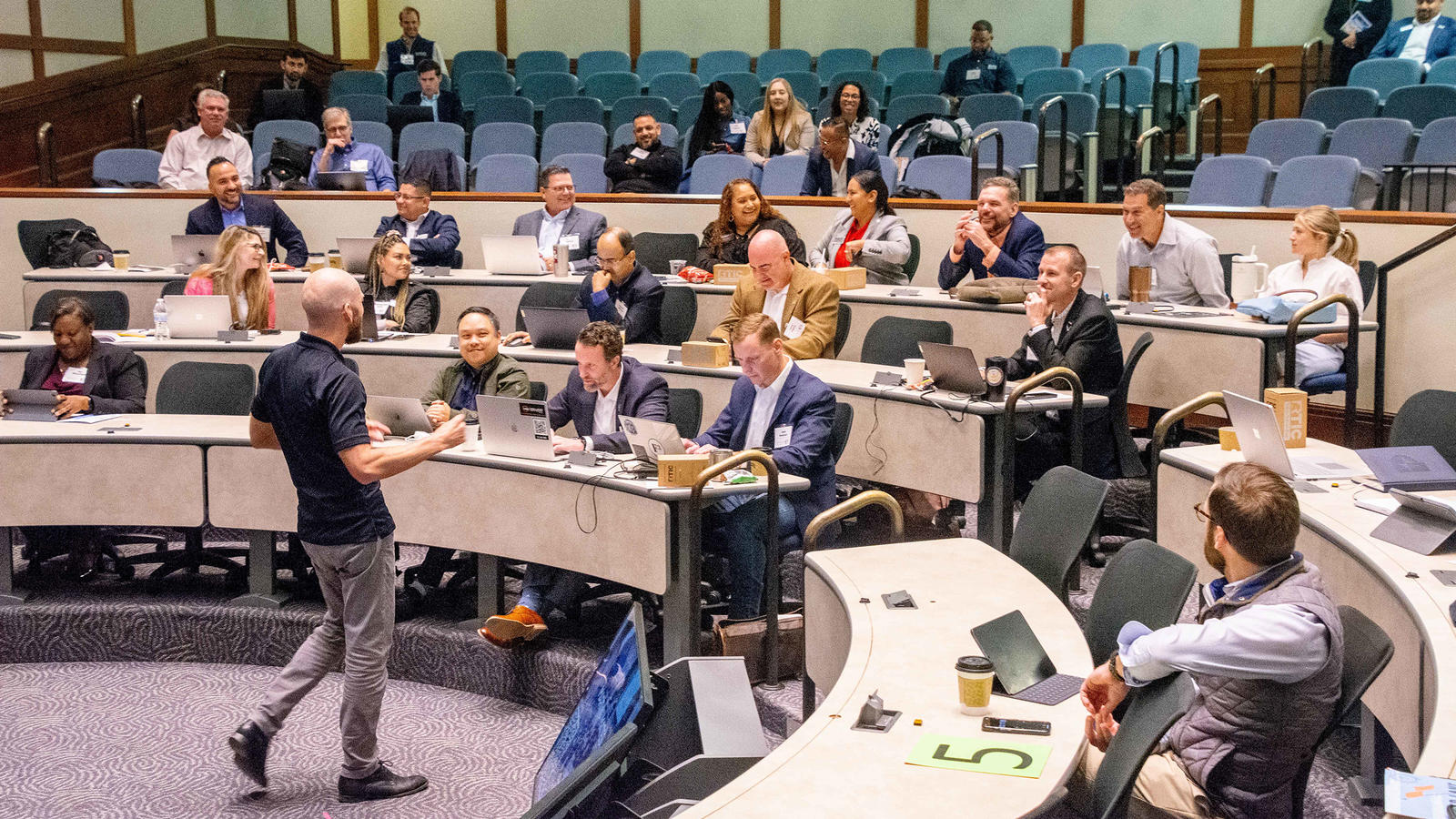
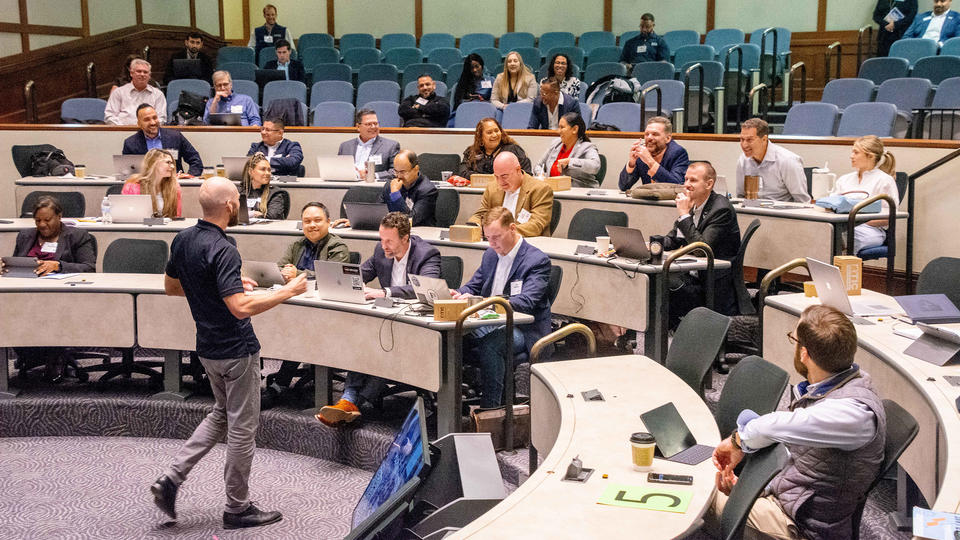
Military veterans to pitch their startups to investors at annual event
On March 13-14, Rice Business is hosting its 11th annual Veterans Business Battle — a forum for veterans to connect with investors, advisers and resources. Each year, the event gives military veterans an opportunity to pitch business ideas for a chance to raise capital.
This year, the Veterans Business Battle is working with the Houston Regional Veterans Chamber of Commerce to increase the event’s impact by inviting Houston-based, veteran-owned businesses to participate in two days’ worth of education, networking and showcasing their business as part of a small business expo.
The Veterans Business Battle began in 2015 with a goal of inspiring and encouraging our nation’s military heroes to become successful entrepreneurs. During the competition, finalists pitch investors, receive feedback from industry professionals, network with potential investors and learn from other entrepreneurial success stories. With more than $5 million in investments, it’s the largest veteran business competition in the country.
What: Veterans Business Battle
When: March 13-14. Agenda can be found here.
Where: Rice University’s McNair Hall
You May Also Like

Rice University’s Jesse H. Jones Graduate School of Business today announced the launch of its Graduate Certificate in Healthcare Management program, a 10-month, credit-bearing professional credential designed for current and aspiring leaders seeking deep expertise in the business of healthcare.
Driving Innovation in Business Education and Preparing Future Leaders for a Globalized World
Michael Koenig, Associate Dean for Innovation Initiatives and Executive Director of Executive Education, shares his experiences in driving innovation within academia, overcoming resistance to change, and leveraging emerging technologies like AI to enhance learning.
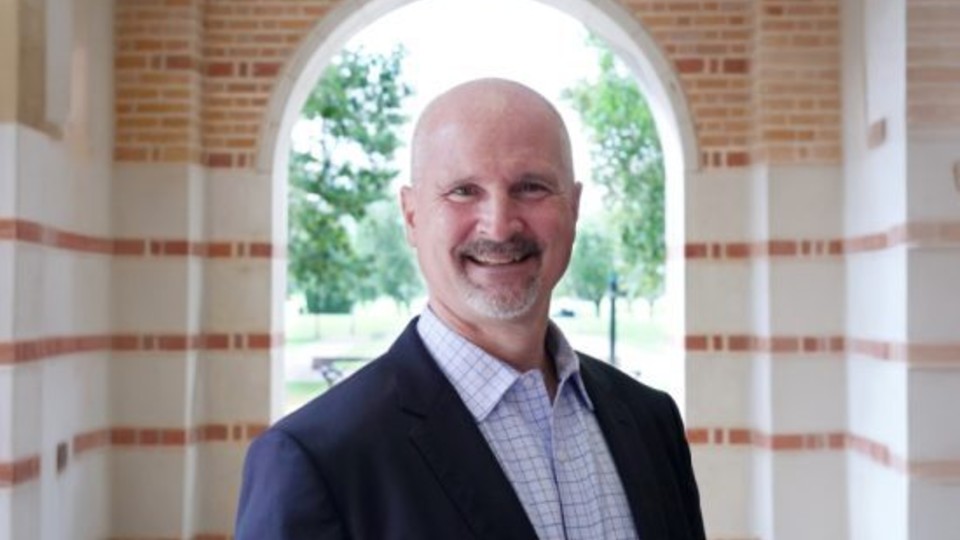
Racial earning gap in gig work eliminated through new rating system
Rice Business research shows when one gig-work platform switched from a five-star rating system to a simple thumbs-up/down, it eliminated a 9% racial earnings gap for their workers.
For millions of gig workers, a customer rating isn’t just feedback — it can determine access to more work, better pay and financial stability.
A new study published in Nature uncovers a hidden problem — racial bias in customer evaluations — which led to a 9% income gap between white and non-white gig workers in a home services platform. The study also proposes an unexpected but simple solution: changing how customers rate workers from a five-star to a thumbs-up/thumbs-down system.
Analyzing 100,759 completed jobs and 69,971 customer ratings from an online home services platform in the United States and Canada, the researchers found that racial minorities received lower ratings than white workers. (The study does not disclose the real name of the platform for confidentiality reasons.)
This small but consistent bias had big financial consequences: Minority workers earned just 91 cents for every dollar their white counterparts made.
But when the platform made one simple change — switching from a traditional five-star rating system to a binary thumbs-up/thumbs-down scale — the racial gap disappeared.
“The numbers don’t lie,” says Sora Jun, study co-author and assistant professor of organizational behavior at Rice Business. “We saw evidence that subtle racial bias was creeping into five-star ratings, quietly chipping away at non-white workers’ earnings. When the rating system was changed, the earning gap was gone.”
The power of dichotomization
Customer ratings influence earnings on many gig platforms. A tenth of a point or even less can push workers into lower income brackets, reducing their pay for identical work done by those rated just above them.
This study reveals that five-star rating systems create space for subtle discrimination, where customers score minority workers slightly lower with a 0.07-star difference (4.72 vs. 4.79).
While this gap may seem small, it had significant financial consequences. For example, if a gig worker earns $40,000 a year, a 9% pay gap means they are taking home $3,600 less annually — purely due to biased ratings.
Multiply this across an entire workforce, and the financial impact is staggering. According to the World Bank, an estimated 154 million to 435 million people worldwide are working gig jobs online, up to 12% of the global workforce.
The research team tested their hypothesis in multiple ways. They began by analyzing real-world data from a platform that changed its rating system abruptly without informing users of the switch. Before the change, white workers were 3.9% more likely to receive a perfect five-star rating compared to non-white workers. But after the introduction of the thumbs-up/thumbs-down system, this gap vanished.
The researchers also ran controlled experiments, where participants were asked to rate identical work by either white or non-white workers using different rating scales.
The results were clear: Racial bias was more pronounced in the five-star system and significantly reduced in the binary system. White and non-white workers received positive ratings at nearly identical rates (95.9% versus 95.4%) in the binary system.
“Five-star ratings can feel objective, but they’re anything but,” Jun said. “They may give customers too much room to let their biases slip in. When we force people to make a yes-or-no decision, they focus on performance, not personal perceptions.”
The bigger picture
Bias in ratings is not just a problem for one company — ratings are used across the gig economy, which spans transportation (Uber, Lyft), delivery services (DoorDash, Instacart) and freelance work (Upwork, Fiverr).
Many platforms rely on customer ratings to allocate opportunities, promotions and even account suspensions. If ratings are biased, so are the economic outcomes.
The findings suggest that platforms can meaningfully reduce racial inequities with a relatively simple intervention. While diversity training and antibias policies are common in corporate hiring, they’re impractical for gig economy customers, who aren’t employees and can’t be required to follow training or bias guidelines.
Changing the way ratings are structured, however, is a simple and scalable fix.
One potential concern is whether switching to a thumbs-up/thumbs-down system removes valuable detail from customer ratings. The researchers acknowledge that binary ratings provide less nuance than a five-star system, but they argue this loss of detail is largely irrelevant.
In practice, most customers inflate ratings with 85% already giving five stars, meaning the extra precision of a five-star scale is more illusion than reality. The researchers say platforms should ask themselves: Do we care more about fairness or fake precision? For now, the status quo is costing real people real money.
“If we’re serious about tackling bias, we can’t just rely on people to be more self-aware,” Jun says. “We need structural fixes. And sometimes, the smallest tweaks — like changing how we rate workers — can make a big impact.”
This article first appeared in Rice Business Wisdom. See Botelho, Jun, Humes and DeCelles, “Scale dichotomization reduces customer racial discrimination and income inequality” in Nature (2025): https://doi.org/10.1038/s41586-025-08599-7.
You May Also Like

Rice University’s Jesse H. Jones Graduate School of Business today announced the launch of its Graduate Certificate in Healthcare Management program, a 10-month, credit-bearing professional credential designed for current and aspiring leaders seeking deep expertise in the business of healthcare.
Real Humans of Pfizer: Karen Verboski, Rice Business MBA ’24, Finance Manager
Karen Veroboski turned an internship at Pfizer during her Rice Business MBA into a full-time offer. Pfizer, one of the oldest pharmaceutical companies in America, offered the culture and fast-paced environment Karen sought.

‘Believe in yourself’: Women in Leadership Conference brings together business leaders, mentors
On Feb. 28, Rice Business hosted the 25th annual Women in Leadership Conference, a beacon of inspiration in the Houston community empowering women to accomplish their career and personal goals.

On Feb. 28, Rice Business hosted the 25th annual Women in Leadership Conference, a beacon of inspiration in the Houston community empowering women to accomplish their career and personal goals. In panel discussions and interactive workshops, attendees heard from leaders across different industries, explored various approaches to leadership and discussed future opportunities for success.
Organized by a committee of Rice MBA students, the conference provides current and future women business leaders with a unique forum to exchange ideas and thought leadership. From topics such as understanding the legal landscape, handling strategic risk-taking, harnessing mentorship and negotiating, the panels include women leaders sharing their experiences and best practices.
“I think I loved negotiation the most,” one of the attendees said. “For all women: Don’t undersell yourself. Believe in yourself. Have confidence. Do the research. Educate yourself in the roles that you’re applying for. Prepare yourself and go for it.”

“My actual workplace is probably just around 10% women or so, and it can be really challenging,” another attendee said. “Many speakers have addressed that today — how to face different environments, how to be taken seriously when you’re in the minority, all of that. I think it’s very interesting, and all the topics have been very applicable to what I experience day to day.”
The executive committee for the annual conference includes MBA students from numerous programs at Rice Business, including the full-time MBA, executive MBA, professional MBA and online MBA. Each MBA program is tailored to meet the diverse needs of the students seeking business education.
Rice Business also has the newly launched Executive Leadership for Women program, whose advisory board includes the student president of the Women in Leadership Conference. The program is designed for women leaders, allies and mentees who aspire to accelerate their careers and help others.
Learn more about this year’s event and past Women in Leadership Conferences here.
You May Also Like

Rice University’s Jesse H. Jones Graduate School of Business today announced the launch of its Graduate Certificate in Healthcare Management program, a 10-month, credit-bearing professional credential designed for current and aspiring leaders seeking deep expertise in the business of healthcare.
Celebrating Women in Business: Together, We Will Break Boundaries
Celebrate International Women’s Day with insights from participants and committee members at Rice Business’ 25th Women in Leadership Conference. This annual event, which inspires leaders with thought-provoking workshops and discussions, is one of many ways our community is committed to accelerating action, opening doors and advancing opportunities for women.


This International Women’s Day, Rice Business is proud to celebrate the women who are shaping industries, opening new doors and redefining what’s possible in business and beyond.
Expanding Opportunities, Innovating Businesses
Our school is committed to accelerating action and elevating women leaders through its organizations, faculty research, conferences and other year-round events.
As Prof. Daan van Knippenberg, co-author of a recent commentary on gender-inclusive leadership in business schools, notes: “True gender-inclusive leadership requires rethinking not just who holds power, but how power itself is exercised. When we elevate diverse perspectives and create systems that value collective decision-making, we build stronger, more innovative organizations. This shift isn't just about equity — it’s about better business.”
From Campus to Career: A Supportive Network
On Rice campus, the student-led Rice Business Women’s Organization is passionate about opening doors and empowering students across our MBA programs by connecting them with successful business leaders, mentors, professional development programs and career opportunities.
Our efforts extend to the student-run Women in Leadership Conference (WILC), an annual event that welcomes attendees from all walks of life. The consistently sold-out conference serves as a platform for women to share their experiences, setbacks and successes with others in the Greater Houston area.
Interested in Rice Business?
25 Years of WILC: Elevating Voices
This year’s 25th Women in Leadership Conference, held on Feb. 28, welcomed nearly 600 attendees and featured uplifting keynotes from Marie Myers and Kathryne Reeves. The day included discussions on important topics applicable to all participants regardless of background or gender — from analyzing the Texas legal landscape and elevating your personal brand to strategizing assertiveness and charting new paths as a women-led venture. Throughout the conference, we asked attendees to share their thoughts on leadership, career growth and the impact of events like WILC. Here’s what they had to say:
What motivated you to attend WILC, and what do you hope to gain from it?
Sofia Romero, industrial planning analyst at Tenaris:
"I recently began my career in leadership, and I wanted to enrich myself with the stories of all the strong women that are here today — especially those who have navigated so many challenges and established themselves as leaders.
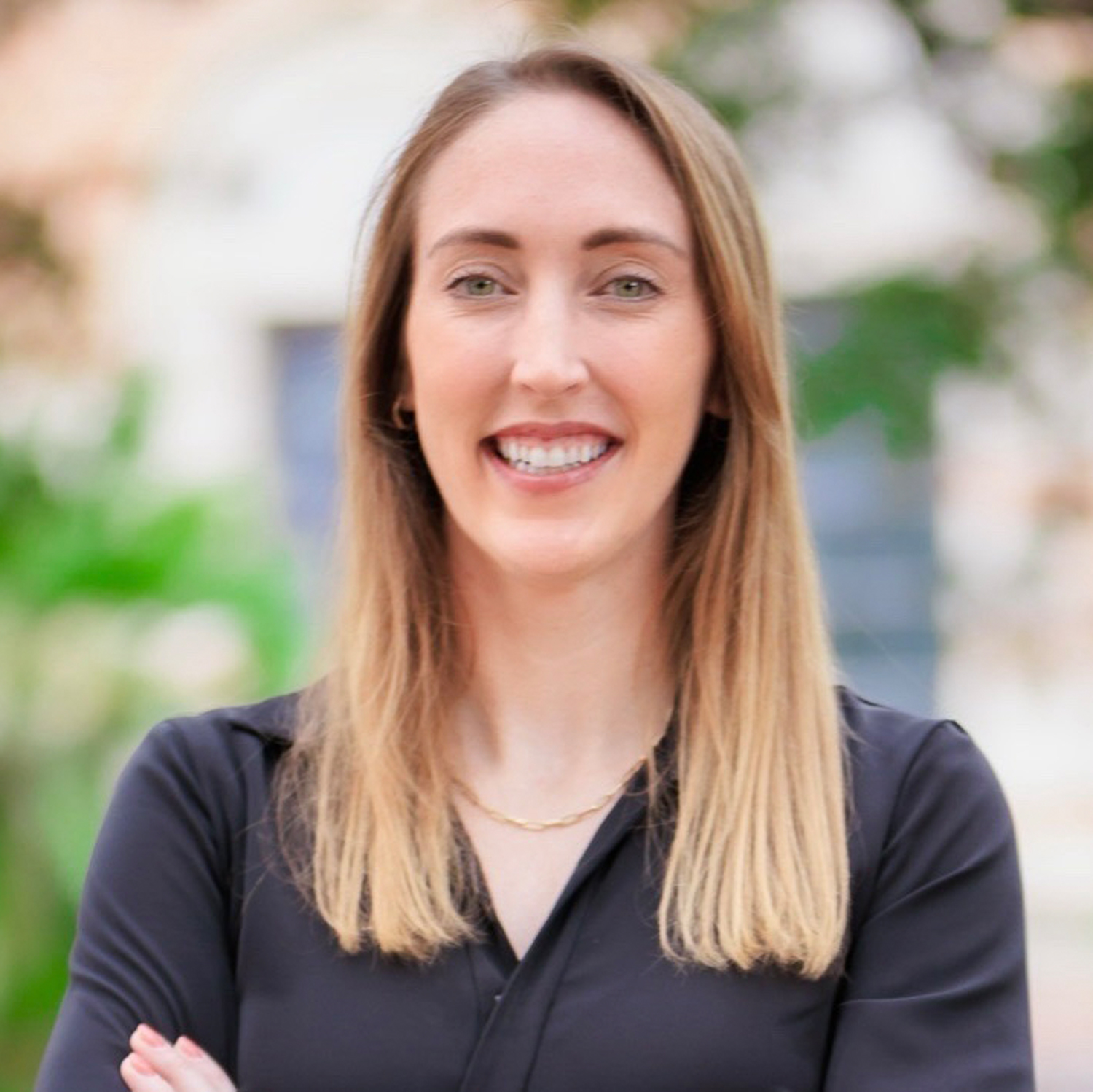
Emily Brown, ’25, WILC president:
"When I began my career in engineering, I was often one of just two women in the room — or maybe even the only woman in the room. I quickly realized how important it would be to surround myself with a group of women that offered support and encouragement, and I’ve since found that at WILC."
What’s one of your key takeaways from WILC?
Sara Cardenas, accounting analyst at Vopak:
“So far, my favorite workshop has been the one on negotiation. The speakers reminded us: don’t undersell yourself. Believe in yourself. Do the research. Educate yourself in the roles that you're applying for, and go for it.”
Ivory Ibuaka, ’27:
“One of today’s keynotes, Marie Myers, addressed something that my current manager, Ashley, has always reminded me: ‘Always remain focused, and try not to shy away from asking the questions that come to mind.’ As a young woman at large corporations, I’ve always been scared to ask questions out of fear that I’ll seem unprepared or unqualified. But it really is important to ask those questions to create visibility for yourself, educate yourself and show your curiosity. Being engaged is always a good thing.”
Who is a female mentor that has impacted your career?
Dildora A. ’23, senior product manager at HP:
“My mentor, Suzy, is very inspiring. She leads with her heart, and she’s true to her values — that's what I respect about her the most. We are both constantly learning from each other, and it’s a beautiful relationship.”

Sarah Aldin, ’25, WILC Operations Chair:
“My manager during my first internship, Mai Abu Kaff, believed in me. She gave me real responsibility at a young age, trusted me to figure things out and taught me so many foundational business skills. The way she supported me and pushed me to do more has had a lasting impact on how I work and lead today.”
Are there any other women you’d like to give a shoutout to?
Emily Brown:
“My sister has always been my role model. She’s autistic, and growing up with her has taught me so much — from learning to enjoy the little things in life to leading with empathy. I’ve learned so much from her, and I’m grateful for the perspective she has given me.”
Sara Cardenas:
“All the women. The women in the workforce, the women at home. We’re one big support system, and I’m so grateful for every woman in my life.”
Shaping the Future, Together
As a testament to our mission, this year’s sold-out Women in Leadership Conference showcased the resilience and ambition of our Rice Business community — and sparked important conversations that will continue to empower women in the years to come.
You May Also Like
Keep Exploring
On The Rice Track: Seeing The World Through Global Field Experience
International full-time MBA student Mercedes Moncada-García shares memories and lessons learned from her recent global field experience to Buenos Aires.

